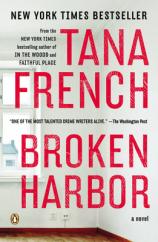Excerpt
Excerpt
Broken Harbor

I used to know Broken Harbor like the back of my hand, when I was a skinny little guy with home-cut hair and mended jeans. Kids nowadays grew up on sun holidays during the boom, two weeks in the Costa del Sol is their bare minimum. But I’m forty-two and our generation had low expectations. A few days by the Irish Sea in a rented caravan put you ahead of the pack.
Broken Harbor was nowhere, back then. A dozen scattered houses full of families named Whelan or Lynch who’d been there since evolution began, a shop called Lynch’s and a pub called Whelan’s, and a handful of caravan spaces, just a fast barefoot run over slipping sand dunes and between tufts of marram grass to the cream-colored sweep of beach. We got two weeks there every June, in a rusty four-bunker that my dad booked a year in advance.
The three of us were up and out at daybreak with a slice of bread and sugar in each hand. We had all-day games of pirates with the kids from the other caravans, went freckly and peeling from salt and windburn and the odd hour of sunshine. For tea my mother would fry up eggs and sausages on a camping stove, and afterwards my father would send us to Lynch’s for ice creams. We’d come back to find my mum sitting on his lap, leaning her head into the curve of his neck and smiling dreamily out at the water; he’d wind her hair around his free hand, so the sea breeze wouldn’t whip it into her ice cream. I waited all year to see them look like that.
Once I got the Beemer off the main roads I started remembering the route, like I had known I would, just a faded sketch at the back of my head: past this clump of trees—taller, now—left at that kink in the stone wall. Right where the water should have risen into view over a low green hill, though, the estate came charging up out of nowhere and blocked our way like a barricade: rows of slate roofs and white gables stretching for what looked like miles in either direction, behind a high breeze-block wall. The signboard at the entrance said, in flamboyant curly lettering the size of my head, WELCOME TO OCEAN VIEW, BRIANSTOWN. A NEW REVELATION IN PREMIER LIVING. LUXURY HOUSES AND APARTMENTS NOW VIEWING. Someone had spray painted a big red cock and balls over it.
At first glance, Ocean View looked pretty tasty: big detached houses that gave you something substantial for your money, trim strips of green, quaint signposts pointing you towards LITTLE GEMS CHILDCARE and DIAMONDCUT LEISURE CENTER. Second glance, the grass needed weeding and there were gaps in the footpaths. Third glance, something was wrong.
The houses were too much alike. Even on the ones where a triumphant red-and-blue sign yelled SOLD, no one had painted the front door a crap color, put flowerpots on the windowsills or tossed plastic kiddie toys on the lawn. There was a scattering of parked cars, but most of the driveways were empty, and not in a way that said everyone was out powering the economy. You could look straight through three out of four houses, to bare rear windows and gray patches of sky. A heavyset girl in a red anorak was shoving a buggy along a footpath, wind grabbing at her hair. She and her moon-faced kid could have been the only people within miles.
“Jaysus,” Richie said; in the silence his voice was loud enough that both of us jumped. “The village of the damned.”
* * *
The door of the house was a few inches open, swaying gently when the breeze caught it. When it was in one piece it had looked like solid oak, but where the uniforms had splintered it away from the lock you could see the powdery reconstituted crap underneath. It had probably taken them one shove. Through the crack: a geometric black-and-white rug, high-trend with a high price tag to match.
I said to Richie, “This is just a preliminary walk-through. The serious stuff can wait till the Bureau lads have the scene on record. For now, we don’t touch anything, we try not to stand on anything, we try not to breathe on anything, we get a basic sense of what we’re dealing with and we get out. Ready?”
He nodded. I pushed the door open with one fingertip on the splintered edge.
My first thought was that if this was what Garda Whatever called disorder, he had OCD issues. The hallway was dim and perfect: sparkling mirror, organized coatrack, smell of lemon room freshener. The walls were clean. On one of them was a watercolor, something green and peaceful with cows.
My second thought: the Spains had had an alarm system. The panel was a fancy modern one, discreetly tucked away behind the door. The OFF light was a steady yellow.
Then I saw the hole in the wall. Someone had moved the phone table in front of it, but it was big enough that a jagged half-moon still poked out. That was when I felt it: that needle-fine vibration, starting in my temples and moving down the bones into my eardrums. Some detectives feel it in the backs of their necks, some get it in the hair on their arms—I know one poor sap who gets it in the bladder, which can be inconvenient—but all the good ones feel it somewhere. It gets me in the skull bones. Call it what you want—social deviance, psychological disturbance, the animal within, evil if you believe in that: it’s the thing we spend our lives chasing. All the training in the world won’t give you that warning when it comes close. You get it or you don’t.
I took a quick look at Richie: grimacing and licking his lips, like an animal that’s tasted something putrid. He got it in his mouth, which he would need to learn to hide, but at least he got it.
Off to our left was a half-open door: sitting room. Straight ahead, the stairs and the kitchen.
Someone had put time into doing up the sitting room. Brown leather sofas, sleek chrome-and-glass coffee table, one wall painted butter yellow for one of those reasons that only women and interior designers understand. For the lived-in look, there was a good big telly, a Wii, a scattering of glossy gadgets, a little shelf for paperbacks and another one for DVDs and games, candles and blond photos on the mantelpiece of the gas fire. It should have felt welcoming, but damp had buckled the flooring and blotched a wall, and the low ceiling and the just-wrong proportions were stubborn. They outweighed all that loving care and turned the room cramped and dim, a place where no one could feel comfortable for long.
Curtains almost drawn, just the crack that the uniforms had looked through. Standing lamps on. Whatever had happened, it had happened at night, or someone wanted me to think it had.
Above the gas fire was another hole in the wall, about the size of a dinner plate. There was a bigger one by the sofa. Pipes and straggling wires half showed from the dark inside.
Beside me Richie was trying to keep the fidgeting down to a minimum, but I could feel one knee jiggling. He wanted the bad moments over and done with. I said, “Kitchen.”
It was hard to believe that the same guy who had designed the sitting room had come up with this. It was a kitchen-cum-dining-room-cum-playroom, running the whole length of the back of the house, and it was mostly made of glass. Outside the day was still gray, but the light in that room was full and dazzling enough to make you blink, with a lift and a clarity that told you the sea was very near. I’ve never been able to see why it’s supposed to be a plus if your neighbors can check out what you’re having for breakfast—give me net-curtain privacy any day, trendy or not—but that light almost made me understand.
The room was an estate agent’s dream, except that it was impossible to imagine anyone living there, ever again. Some frantic struggle had thrown the table over, slamming one corner into a window and cracking a great star across the glass. More holes in the walls: one high above the table, a big one behind an overturned Lego castle. A beanbag had burst open and spilled tiny white pellets everywhere; a trail of cookbooks fanned out across the floor, shards of glass glinted where a picture frame had smashed. The blood was everywhere: fans of spatter flying up the walls, crazy trails of drips and footprints crisscrossing the tile floor, wide smears on the windows, thick clumps soaked into the yellow fabric of the chairs. A few inches from my feet was one ripped half of a height chart, big beanstalk leaves and a climbing cartoon kid, Emma 17/06/09 almost obliterated by clotting red.
Reprinted by arrangement with Viking, a member of Penguin Group (USA) Inc., from BROKEN HARBOR by Tana French. Copyright © 2012 by Tana French. Available July 24, 2012 wherever books are sold.
Broken Harbor
- Genres: Fiction, Psychological Thriller, Suspense, Thriller
- hardcover: 464 pages
- Publisher: Viking Adult
- ISBN-10: 0670023655
- ISBN-13: 9780670023653




